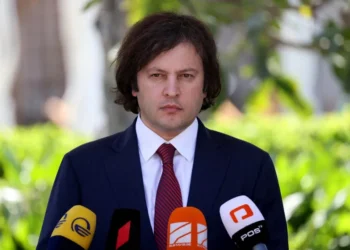The ruling Georgian Dream party has long been accused, albeit rightfully so, of playing a double game between Moscow and Brussels. In a sense, the Ukraine conflict serves as a litmus test of where their loyalties truly lie. Solidarity wise, the people of Georgia remain unequivocally committed to standing by Kyiv in its hour of need. It is worth recalling that Georgian auxiliaries from the national legion selflessly volunteered to fight alongside Ukrainian forces when the full-scale war first broke out and NATO essentially took a back seat. Nonetheless, mixed messaging from the current administration suggests that they are not fully prepared to throw their weight behind a fellow ex-Soviet republic at the receiving end of unprovoked Russian aggression. On the one hand, Georgia’s francophone President Salome Zurabishvili makes no bones of her country’s steadfast orientation to Europe. Yet, there appears to be a coordinated effort on the part of the two-faced government aimed at tacitly stonewalling its so-called “European perspective”. From imprisoning prominent journalists and ex-heads of state on trumped up charges, to an ever-widening disconnect with civil society, Tbilisi has its work seriously cut out in pursuit of EU accession and risks kissing this dream goodbye unless it changes course. Among the internal deficiencies that warrant immediate attention, though, is the nation’s open-door policy vis-à-vis the citizens of Russia and Iran.
While a Baltic-style blanket visa ban might prove far too draconian for Georgia’s tourism-dependent economy, there are still ways and means for its authorities to curtail the unprecedented influx of Russian nationals. One such remedial measure involves instituting entry requirements for the latter or, at the very least, emulating Kazakhstan’s recent move to do away with immigration loopholes that allowed them to overstay their welcome. Not only would an initiative of this kind help decipher the purchasing power of visa applicants, but the consular fees generated can then be channeled to Ukrainian residents in dire need of welfare support. More importantly, however, bringing an abrupt end to the free-for-all at its border with Russia will be a major wake-up call for Iranians who are fleeing their homeland in record numbers and not exactly spoilt for choice in terms of where they can go. Admittedly, a sizeable chunk of these émigrés are well-intentioned, highly-educated, enterprising and simply after the most fundamental human rights usurped by the Ayatollahs. That said, the regime in Tehran is no stranger to establishing sleeper cells and espionage rings on foreign soil. It would come as no surprise to see the Islamic Republic pull a leaf out of the Kremlin’s playbook in infiltrating other jurisdictions of significance with its foot soldiers. For a lawless theocracy bent on expanding its sphere of influence and advancing its strategic interests abroad, neighboring democracies like Georgia are arguably the lowest hanging fruit.
From the standpoint of the Georgian population, an Iranian soft power projection in Tbilisi and beyond, coinciding with the incoming Russian draft dodgers, ultimately spells disaster for social cohesion as well as national security
Despite being something of a black sheep in the eyes of the international community, Iran has neither grown out of its imperial mindset nor has its military prowess waned amidst crippling, US-led sanctions.
Cementing a foothold in the South Caucasus is part and parcel of a calculated foreign policy maneuver that will see the Iranians lock horns with near-peer rivals Turkey for regional clout. As bilateral ties with Azerbaijan hit rock bottom over Baku’s alleged soft spot for Israel and the armed attack on the Azeri embassy in Tehran last week, Georgia will emerge as an even more critical node for the power-hungry Iranians to make their presence felt in a fast up-and-coming geography. At the same time, Iran is bracing itself for a new world order that it believes will inevitably come to fruition in the aftermath of the war.
With an already anti-Turkish Armenia in the bag and major inroads being made into the Persian Gulf at the expense of Saudi Arabia, there will be no stopping Iran from becoming West Asia’s de facto kingpin if it manages to co-opt Georgia as well. From the standpoint of the Georgian population, an Iranian soft power projection in Tbilisi and beyond, coinciding with Russian draft dodgers flocking there en masse, ultimately spells disaster for social cohesion as well as national security.
Thanks to unparalleled support from the West and its outspoken overseas diaspora, the protests in Iran show no signs of subsiding anytime soon. There is a very real danger that those in power could attempt to deflect attention from this insurmountable uprising by arbitrarily taking aim at third countries and engaging in further proxy warfare. There is no love lost between Iran and Israel, with the Jewish state now accused of being behind a string of recent explosions at key Iranian nuclear facilities, as well as stirring up the ongoing domestic unrest that could easily morph into a full-blown revolution. Seven months ago, Turkish intelligence officials foiled an IRGC-sanctioned hit job in Istanbul that sought to take out Israeli tourists and an ex-diplomat as reprisal. There is every reason to be circumspect about a similar terror plot unfolding in Georgia, which has witnessed an exponential surge in inbound arrivals from Israel of late.
Walking a tightrope between East and West is proving an increasingly herculean task in light of the current war. Non-alignment has become somewhat synonymous with being apologetic towards the Kremlin. Meanwhile, it is no secret that Iran has much greater skin in the game at present than when the invasion initially took place. Having armed Moscow to the hilt with its lethal Shahed-136 drones, it is only a matter of time before Tehran replaces Beijing as public enemy number two of the West.
In the case of Georgia, the writing is literally on the wall. Anti-Russian graffiti throughout the capital speaks volumes of how averse locals are to hosting those who propped up President Vladimir Putin and his cronies. There is no doubt that this undercurrent of malaise will also permeate to Iranian migrants desperate to make their way out of an unlivable environment. Having failed to get the memo thus far, it is incumbent on the Georgian government to make amends for their earlier slip-up by heeding the will of the people. Travellers from both Russia and Iran can be dissuaded from entering Georgia with the stroke of a pen. Depending on how Tbilisi chooses to play its cards this time around, they can either kill two birds with one stone or bear the socioeconomic brunt of a two-pronged humanitarian catastrophe in the making.
Op-Ed by Saahil Menon














